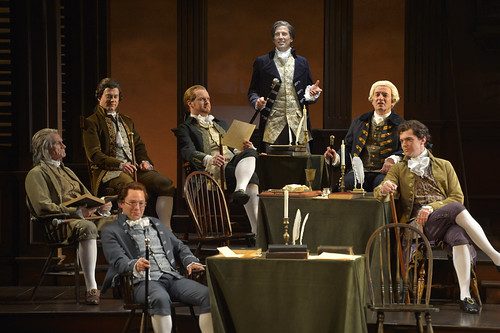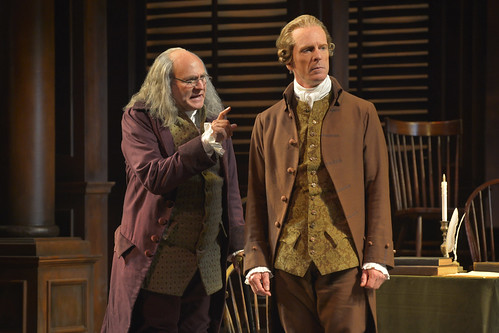Founding Fathers sing a show tune in ACT’s spirited 1776
Members of the Second Continental Congress prepare to vote on independence in Tony Award-winning director Frank Galati's staging of the musical 1776 at American Conservatory Theater's Geary Theater. Below: Andrew Boyer (left) is Benjamin Franklin and John Hickok is John Adams. Photos by Kevin Berne
American Conservatory Theater opens the new season with canny revival of the 1969 musical 1776 originally produced last year at the Asolo Repertory Theatre in Sarasota, Fla. Tony Award-winning director Frank Galati helmed the patriotic tuner in time for the presidential election (which somehow seems a lot further behind us than just a year), and now he has brought his creative team and his leading players to San Francisco along with a cast fleshed out with some lively locals.
1776 is an unusual choice for a musical and creators Sherman Edwards (music and lyrics) and Peter Stone (book) take a rather unusual approach in that they've crafted more of a play than a musical, but the dozen or so songs somehow work to add a humanizing and emotional layer to a history lesson we think we know but was actually messy and contentious and full of ominous compromise. And though this tale about how the 13 colonies made the decision to break from England is ultimately a patriotic show – it's hard not to be moved by the very action of creating a brand-new nation – it's not a flag-waving, firework-popping gloss on the great American creation myth. Perhaps that's why it was such a hit in 1969, the same year that Hair was letting the sunshine in and taking an entirely different approach to the American experience.
If John Adams was really "obnoxious and disliked" by his fellow congressmen, at least in musical terms he's absolutely charming, especially as played by the marvelous John Hickok, who has a clarion voice and a crisp character. He radiates intelligence and annoyance in equal measure, and it's nice that the show allows him some warmhearted interactions (via letters) with his wife, Abigail (Abby Mueller) and gives him a chance to show off his dancing skills with Martha Jefferson (Andrea Prestinario).
But mostly Adams wrangles with the members of Congress who do not favor independence, especially his rival John Dickinson of Pennsylvania (Jeff Parker), who was proud to be a subject of the British Empire, and Edward Rutledge of South Carolina (Jarrod Zimmerman), a fierce and slickly charming advocate of slavery. Adams is even cantankerous with his key allies, most notably Benjamin Franklin (Andrew Boyer) and Thomas Jefferson (Brandon Dahlquist), but his frustrations come from someplace noble – his firm belief in what is emerging as the American character and the need to start fresh with a nation conceived in liberty for all its citizens (or the white ones anyway, as it turned out).
The musical gets off to a robust start with "Sit Down, John," an expression of the Congress' contempt for Adams' constant harangues, and then gives us some of that contempt first hand in Adams' own "Piddle, Twiddle" before a reprieve in which Adams exchanges thoughts with his wife. Then Richard Henry Lee of Virginia (the ultra-charming Ryan Drummond) gives us an appealing song and dance about his family (fami-Lee) and then...talking. The musical suddenly turns into a play. The approximately 30 minutes between Lee's song and the next, "But, Mr. Adams –," holds the record for the longest stretch in a musical with no music.
Though taking certain liberties with history, 1776 is never the less a beautifully constructed piece of theater, creating suspense around whether or not this Congress can muster a unanimous vote for independence, which seems highly likely right up until the last minute. Even within that suspenseful structure, the musical still finds time to give Jefferson kudos for his virility ("He Plays the Violin," beautifully performed by Prestinario) and to allow a military courier (Zach Kenney) a moment to bring the realities of the Revolutionary War into the chamber ("Momma, Look Sharp," though how was there to observe the soldier's final words and death while his mother searched for him through the night remains somewhat mysterious).
Galati's production runs just under three hours but is never dull. His large 26-member cast is full of personality but free from unnecessary fussing. Music director Michael Rice and his 10-piece orchestra deliver rich, vibrant sound for a score that, despite its late '60s origins, feels entirely contemporary. Because Sherman's score is not rooted in any distinct time period, the music sounds distinctly of the musical theater without pandering to 18th-century details or '60s pop conventions.
Like the Spielberg movie Lincoln, 1776 takes a part of American history we think we know well, artfully deconstructs and puts it back together as a dramatic narrative that speaks to how connected we remain to our heritage, whether we know it or not.
[bonus interview]
I talked to 1776 director Frank Galati for a feature in the San Francisco Chronicle. Read the story here.
FOR MORE INFORMATION
Sherman Edwards and Peter Stone's 1776 continues through Oct. 6 at the Geary Theater, 415 Geary Ave. San Francisco. Tickets are $20-$160 (subject to change). Call 415-749-2228 or visit www.act-sf.org.

